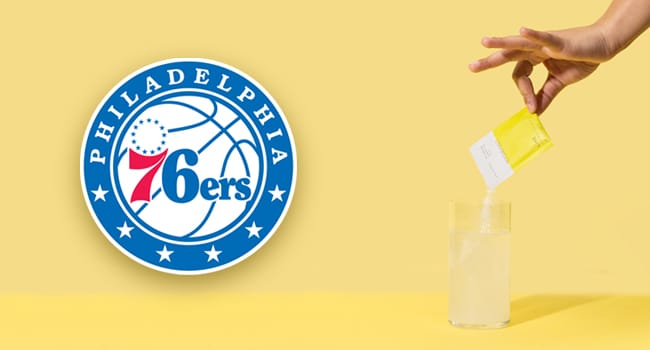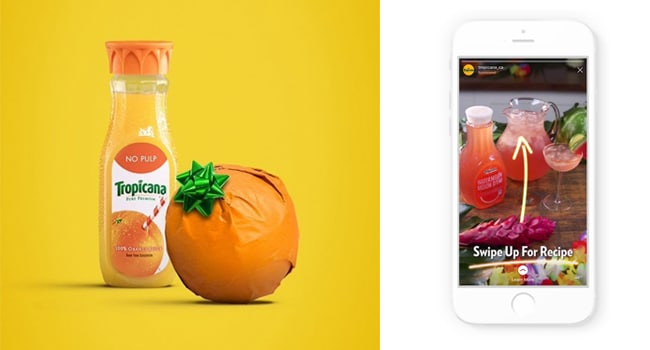
76ers Incubator Backs Hydrant Powder Mix
The NBA’s Philadelphia 76ers have welcomed Hydrant, a hydration powder mix, into its Innovation Lab, Forbes reported. The team’s incubator also helped Hydrant close a $2 million investment round.
Hydrant was founded in 2017 by John Sherwin, an Oxford-trained biologist, and Jai Jung Kim, who previously worked in private equity. According to Sherwin, the ingredient blend in Hydrant allows consumers to absorb electrolytes into the digestive system earlier, offering faster hydration than other sports drinks or water.
Seth Berger, co-founder of basketball clothing company And1 and managing director of the Innovation Lab, told Forbes that his daily headaches went away after he began adding the drink to his morning routine. The lab invested in Hydrant in November.
The 76ers’ incubator, which invests in six companies per year, offers emerging brands free office space, food, housing and management advice.
“None of the companies that have come into the lab have left the lab except the ones that have been sold,” Berger told Forbes. “We really are long-term partners.”
Hydrant is seeking to make a name for itself in the sports drink category by focusing on the importance of morning hydration and marketing the product to the everyman rather than athletes.
“Hydration requires consistent daily effort,” Kim told Forbes. “And it’s really important to start this process first thing in the morning. And we aspire to be the number one morning hydration brand in America.”
Since its soft launch online six months ago, the brand has reported 10X revenue growth, according to Forbes. Hydrant is currently sold on its website and Amazon. Berger told Forbes that they plan to integrate the drink into the 76ers’ and the NHL’s New Jersey Devils’ nutrition and conditioning routines next season.
Kombucha Is Bad For Your Teeth
While kombucha is associated with health benefits like aiding digestion and boosting immunity, dentists are claiming the sweetened fermented tea may also be eroding tooth enamel, according to Salon.
“Kombucha is nearly as acidic as pop and energy drinks,” Dr. Bobby J. Grossi, founder of the Grossi Institute for Dental Assisting, told Salon. “Acidic drinks mess with the pH level of the saliva which ideally should be 7 or 7.3, when the saliva level becomes more acidic it becomes a breeding ground for bacteria which can take over the mouth.”
The subsequent bacteria contributes to plaque accumulation and erosion of tooth enamel, which can cause gum disease or tooth decay. The acid is crucial for the symbiotic culture of bacteria and yeast (SCOBY) used in the production of kombucha, Salon noted, which makes it difficult to manufacturers to reduce its negative dental health effects.
Dr. Greg Grobmyer of AuthorityDental.org recommended that those who drink kombucha should rinse their mouths after consumption, and avoid brushing their teeth for at least half an hour.
Texas to Ban Food Stamps For Sodas, Energy Drinks
CBS News reported this week that a proposed Texas bill could ban the use of food stamps to buy energy drinks and sodas, as well as other sugary products.
Proposed on March 8 by Texas state Rep. Briscoe Cain, House Bill 4363 would block those using the Supplemental Nutrition Assistance Program (SNAP) from purchasing energy drinks, sweetened and carbonated beverages, candy, potato chips and cookies.
“At-risk Texans and families who utilize the Supplemental Nutrition Assistance Program are often the most susceptible to diabetes and the serious complications associated with it,” Rep. Cain told local media outlets. “HB 4364 seeks to curb the spread of diabetes and other health complications among Texans in at-risk populations by eliminating sugary drinks and snacks from the state’s nutrition assistance program.”
The bill states that the prohibition would not apply milk or milk substitutes like soy or almond milk, infant formula, fruit or vegetable juice with no added sugar and drinks other than soda that contain a vitamin or mineral and protein source.
If passed, the bill will go into effect September 1, 2019.

Tropicana Teams Up with Facebook on Ad Campaign Test
Pepsi’s Tropicana juice brand recently teamed up with Facebook to determine whether the return on investment for social media advertising could rival that of TV, Adweek reported.
While social media platforms like Facebook and Instagram have proven to be strong marketing channels, Dave Sommer, head of industry for CPG at Facebook, told Adweek that CPG brands have historically invested more in TV advertising.
“We weren’t confident that moving a TV-sized budget to social would have the same effect,” Sommer told Adweek, noting that CPG brands had previously turned to TV advertising because it was considered to be the medium with the broadest reach.
PepsiCo director of analytics Bunmi Onibokun told Adweek the campaign was an “experiment in its purest form.”
The autoplay video campaign, which according to Adweek “followed the social network’s creative and media best practices,” had a one-to-one return on ad spend. It reached 38 million households, with return on ad spend up 45% and sales volume up 58% compared to Facebook’s other digital campaigns.
“Based on the results we have now, we are now more confident in what we’ll do next,” Onibokun told Adweek. “The test has proven itself.”
Unsafe Levels of Arsenic Found in Some Bottled Water Brands
Consumer Reports (CR) released the results of an investigation into arsenic levels in bottled water brands last month.
For the investigation, CR reviewed reports and test records from bottled water brands and federal and state regulators. The investigation found several brands with arsenic levels above 3 parts per billion (ppb). While federal regulations permit arsenic levels of up to 10 ppb, CR claims experts believe water with levels higher than 3 ppb can pose a health risk if consumed long-term.
CR found that 11 of the 130 brands reviewed had detectable levels of arsenic. Six brands were found to be at or above 3 ppb: Whole Foods’ Starkey, Keurig Dr. Pepper’s Peñafiel, Crystal Geyser Alpine Spring Water, Danone’s Volvic and regional brands Crystal Creamery and EartH₂O.
Most brands that responded to CR’s request for comment said they were in line with the government standard levels. Crystal Creamery and Crystal Geyser did not respond.
Due to CR’s questioning, KDP conducted new tests on Peñafiel last month and found arsenic levels of 17 ppb. The company told CR that it subsequently halted production for two weeks in Mexico to improve filtration, though a product recall was not issued.
Whole Foods released a statement claiming that after testing Starkey again, the product was found to be compliant with FDA standards.
CR found products Aquafina, Dasani, Essentia, Evian, Smartwater and Poland Spring to have levels below 3 ppb.
According to CR, consumption of arsenic can increase the risk of cardiovascular disease and certain cancers, among other health problems. Arsenic can be removed from water using treatment processes.